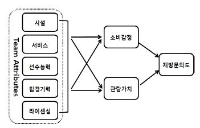
The purpose of this study was to provide managers and owners of Korea professional baseball teams with the necessary information for improving managerial performance by fan acquisition and retention. This paper chose LG, Nexen, and SK fans over the age of 17 as population of this study who visited at least twice home games held in the Jamsil, Mokdong, and Munhak baseball stadium. For the analysis of data, 413 questionnaires were used using SPSS 15.0 Windows and Amos 7.0. To examine respondents demographics traits, frequency analysis was processed and reliability analysis, confirmatory factor analysis and correlation analysis for relationship among the variables were conducted. Also, convergent validity analysis and discriminant validity analysis were made. Finally, path analysis was made for the verification of model suitability and of research hypotheses through structure equation modeling. The research results are as per the below. First, team attributes like physical facilities, team performance and licensing had significantly positive influence on consumption emotion. Second, team attributes like service and team performance significantly positive impact on viewing value. Third, consumption emotion had significantly positive impact on revisit intention. Fourth, viewing value had significantly positive impact on revisit intention.


Purpose Based on Haidt's social-intuitionist theory, this study analyzes the differences in ethical decision-making between sport athletes and the general public in order to understand the ethical judgment tendencies of athletes and examine the determining factors influencing their judgment from the perspective of their environment. In so doing, this study hopes to motivate education for enhancing ethical consciousness as well as institutional policy. Methods To this end, 200 elite athletes in their twenties registered for more than 10 years at the Korean Sports Association and 200 college students in their twenties from five universities in Seoul were selected for comparison. Response trends for each item were analyzed by percentage, and differences between groups were confirmed by the χ2 test method. Results The results are as follows. First, in general ethical situations, athletes usually showed a compulsory ethical view that emphasized principles, whereas in a sports situation, they showed a double consciousness and revealed a very strong consequential ethical view which put much emphasis on outcome. Second, athletes strongly maintained a Confucian ethical view that recognized ethics as a norm compared to the general public and, as a result, it was found that paternalism was relatively stronger than rationalism in their ethical decision making. Third, athletes regarded other people's thoughts and group interests as important criteria for ethical decision-making rather than individual thoughts and interests, and showed a group-centered mindset which emphasized group harmony and relationship. Fourth, while the general public viewed excellent athletes as those with excellent skills and good personality, and valued their morality, athletes thought relatively little of the influence and importance of morality in their success. Finally, it was found that coaches and managers were fundamental to the formation of the athlete’s moral view. Conclusion An in-depth understanding of sports participants' ethical awareness should come first in order to enhance ethical consciousness in sport. I hope this study will work as a catalyst for research which approaches athletes' ethical consciousness from a socio-cultural context.